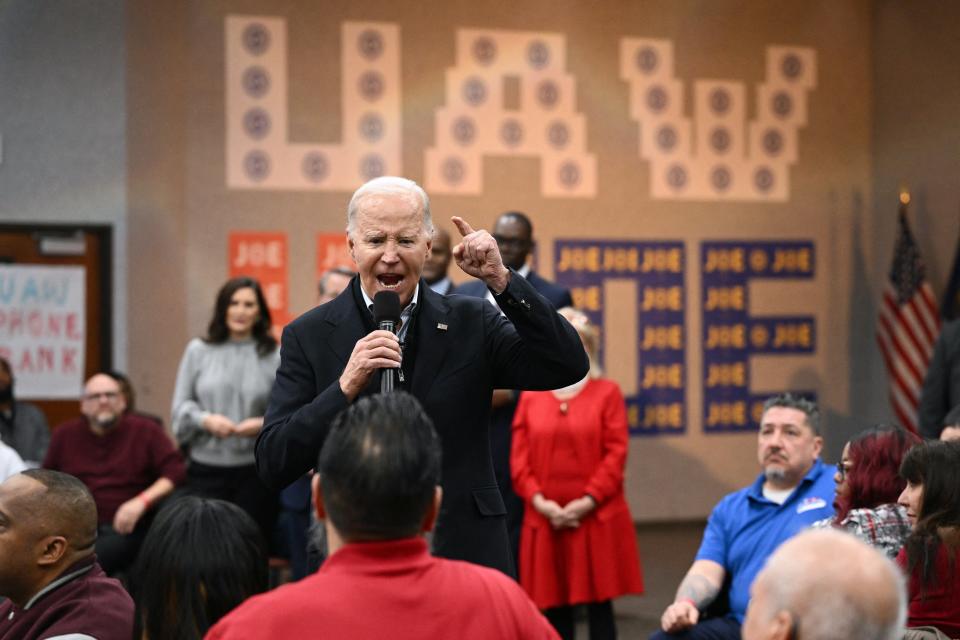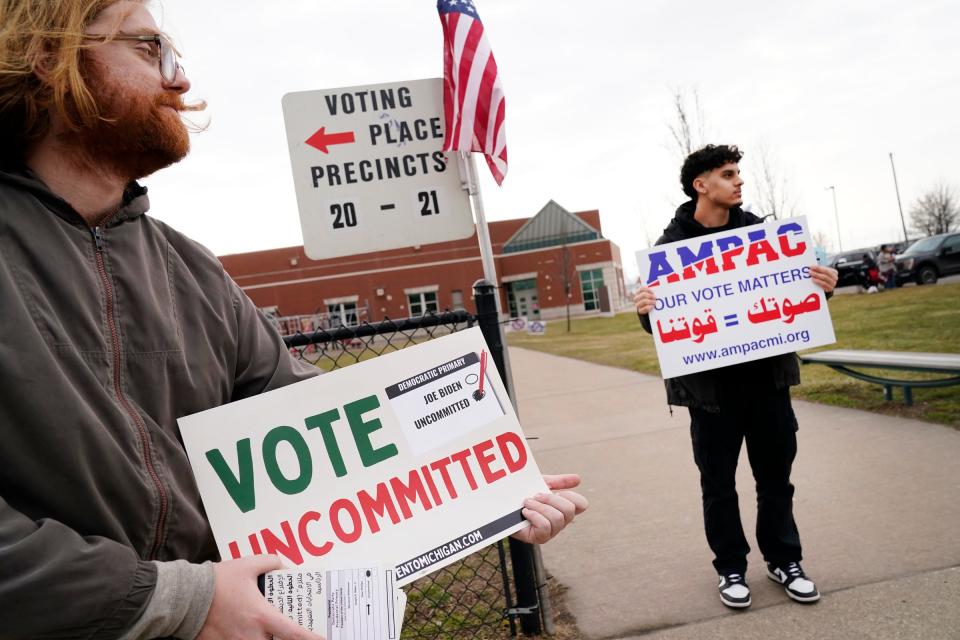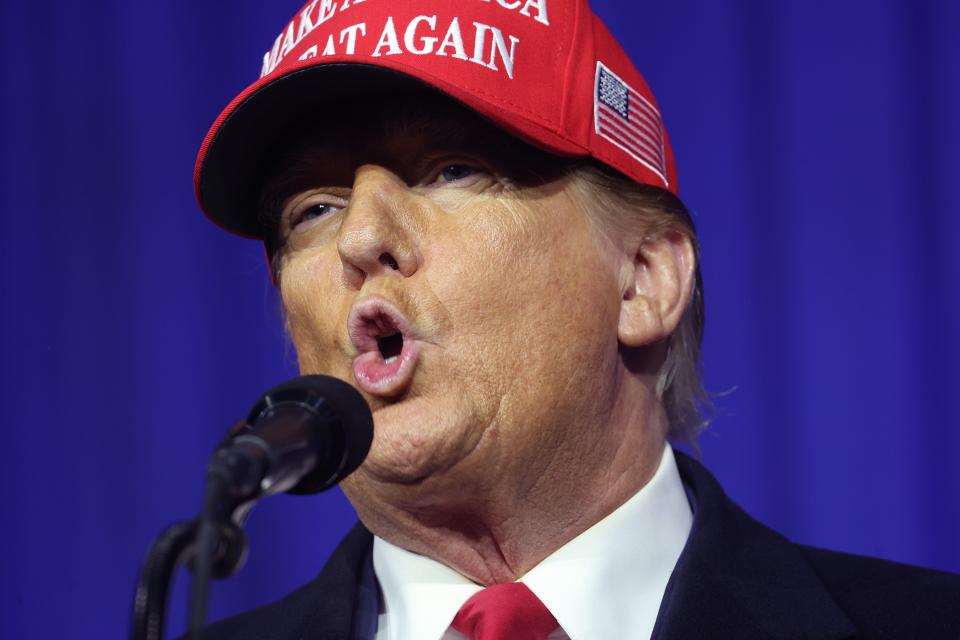The primary message? Plenty of 'meh' votes for a rematch between Biden and Trump.
- Oops!Something went wrong.Please try again later.
- Oops!Something went wrong.Please try again later.
- Oops!Something went wrong.Please try again later.
The level of voter engagement in last Tuesday's presidential primaries in Michigan appeared to indicate what a lot of polls have already shown: When it comes to a rematch between President Joe Biden and former President Donald Trump this fall, voters — or at least a substantial number of them — aren't enchanted with their choices.
In the Democratic primary, Biden won easily, as expected. Also, as expected for what was a largely uncompetitive race with an incumbent president in the running, turnout was down considerably from what it was among party primary voters in the two previous elections (when they were facing an open seat and challenging a sitting Republican president, Donald Trump).
But Biden's share of the Democratic vote, 81%, while large, was well beneath the level of the previous two presidents' shares of their parties' primary vote in Michigan as they ran for reelection: In 2012, then-President Barack Obama got 89% of the Democratic vote; in 2020, then-President Donald Trump got 94% of the Republican primary vote.
Trump, running for reelection again this year, also didn't see anywhere near that level of support in Tuesday's Republican primary, even though there was little campaigning against him or by anyone else: He won 68% of the GOP primary vote, as his former ambassador to the United Nations and former South Carolina Gov. Nikki Haley won about 27% for two days' worth of work ahead of the primary. And while Republican primary engagement was well over its level in 2020 — rising from about 683,000 voters that year to 1.1 million this year — it was still well short of the 1.3 million GOP primary voters in 2016.
In the state's Democratic primary, meanwhile, the number of participants fell from 1.6 million in 2020 to about 764,000, according to still-unofficial tallies from the Michigan Secretary of State's Office as of midday Friday — and likely would have been far less but for the campaign to get Democratic primary voters to vote "uncommitted" as a protest against Biden's support of Israel in its campaign in Gaza, which generated more than 100,000 votes. In 2016, with the White House up for grabs, 1.2 million Michigan voters participated in the Democratic primary.
"The big change is that it's been a dud — the presidential candidates are racing toward renomination even though people say they are dissatisfied," said Matt Grossmann, director of the Institute for Public Policy and Social Research at Michigan State University and a political science professor and author. "You would usually see a real contest on at least one side."

That still leaves all kinds of questions to be answered moving on to next week's Super Tuesday contests, when Trump will likely all but secure the GOP nomination, and Michigan is very much among a handful of swing states expected to determine the outcome of the election again in the fall.
It's dangerous to read too much into primary results because the expected nominees aren't facing each other head-to-head. But there are some interesting data points to note:
Clearly, Trump was still able to motivate his base in last Tuesday's primaries, an indication he will likely do so again in November: In the most staunchly Republican-leaning congressional districts in the state — the 1st, in the Upper Peninsula and northern Lower Peninsula; the 2nd, in mid-Michigan; the 5th, in south-central Michigan and the 9th, in northern Macomb County and the Thumb — Republican primary engagement more than doubled and in some cases nearly tripled Democratic primary engagement. In each case, Trump ran farther ahead of Haley than he did elsewhere, topping 70% of the vote. In the 9th, the most staunchly pro-Trump area in the state, he won 74% of the vote to Haley's 21%.
Democratic engagement simply wasn't as high, which is unsurprising given Biden's incumbency and the seeming inevitability of his renomination. In no congressional district did 100,000 voters select the Democratic primary ballot, unlike three where Republican primary voters surpassed that mark (and three others in the 90,000-plus range), despite, again, Trump's also running largely unchallenged. And the places where Democratic engagement was highest — in the 6th Congressional District based in Ann Arbor; and in the 12th, which includes western Detroit, western Wayne and the large Arab American and Muslim communities around Dearborn — the "uncommitted" vote ran the highest, around 17% of the total, and Biden's support dipped below 80%.
And while it's not unusual to see a drop-off in engagement in an incumbent's primary, the fact that Republican engagement was higher in some toss-up or outright Democratic-leaning areas — at a time when the Biden campaign, the Democratic Party and voters generally are aware that many polls have Trump leading or at least tied in several battleground states, including Michigan — is worth noting. In the 3rd Congressional District in west Michigan, a Democratic-leaning toss-up area, some 84,000 voters cast a Republican ballot compared with about 52,000 Democratic primary voters; in the 7th, a pure toss-up in mid-Michigan, it was 93,000 Republican ballots to 62,000 Democratic ones. In the 8th, a toss-up district around Bay City, Saginaw and Flint, it was 75,000 GOP ballots to about 59,000 Democratic ones. In the 11th, a solidly Democratic-leaning district covering most of Oakland County, 77,152 Republican primary ballots were cast to 72,868 Democratic ones. And with the exception of the 11th, Trump's raw vote total in the other three was higher than Biden's.
"Republican areas had higher turnout," Grossmann said. "It's worth taking the signal that Republicans seem engaged and it's an open question how engaged Democrats are."
Suburban involvement could make, break Biden in fall
Now, in many cases, those toss-up/Democratic-leaning areas were where Haley did better against Trump compared with her statewide percentage (though not always; in the 8th, around Flint, Haley's totals were below her statewide percentage). In some cases, that involved Democrats crossing over as a protest vote against Trump, such as the Republican primary ballot cast in Ann Arbor by 66-year-old Jon Gabrielsen, an automotive consultant, who voted for Haley.
He'll vote for Biden in the fall if, as expected, he's the nominee. "I’m among the three-quarters of Americans who don't like either choice," he said. "(But) not voting at all I think is worse."
There are still questions underpinning the level of voter engagement in some key suburban areas like the 11th Congressional District in Oakland County and the 3rd in Kent County in the primary that could haunt Biden, however. Without question, turnout in those areas in 2020 overwhelmed Trump's mammoth support in more rural areas and led to Biden's winning the state by about 3 percentage points, or about 154,000 votes.
This year, both campaigns will be prodding and probing those primary vote totals to see whether that level of overt support is still there heading into the fall — especially if some progressives and members of the Arab American and Muslim communities refuse to back Biden and sit out the election.
“We have to tell him to stop killing Palestinian people,” Imad Alsoofi, 47, of Dearborn, who voted uncommitted, told the Free Press on Tuesday. “We have to bring the money for the American people. The American people right now they are hungry, they are homeless. Why all the money for overseas? American people first.”
Lansing political pollster and analyst Ed Sarpolus noted in an analysis of Tuesday's primary results that the places where "uncommitted" did well — notably Dearborn and Ann Arbor — are also places that gave larger levels of support to U.S. Sen. Bernie Sanders of Vermont, when he won the Michigan's Democratic presidential primary against Hillary Clinton in 2016. Many believe her loss in the primary that year presaged her narrow loss to Trump in the general election.

What's less than clear is what those voters — or, more significantly, voters across the state who checked the "uncommitted" box — do in the fall.
But even with Biden dogged by questions regarding his age — he's 81, four years older than Trump at 77 — as well as border security and inflation, there is no doubt that the president enjoys strong support in many circles and that he and his campaign expect to see their numbers swell as voters increasingly understand that Trump will be his opponent and become more engaged. There are plenty of voters now, like 58-year-old Felicia Hogan, of Detroit, who are offering unequivocal support for the current president, calling him "great."
And while many of Trump's base of supporters are staunchly at his side — voters like Deb Taylor, in Saginaw County, who believes "he's the only one out there who’s going to get this country back on track” — there are others less sanguine about their choices.
David Montgomery, 57, of Grand Rapids Township, voted for the former president in the Republican primary on Tuesday but said, "both options stink, at this point."
“I think there's a lot of people holding their noses right now on this vote, including me,” he said.
It will be months of seeing how those dynamics play out, said David Dulio, political science professor and director of the Center for Civic Engagement at Oakland University. Months of TV ads, months of speeches, months of rallies. And, as both candidates know, Michigan matters.
Dulio wonders, though, whether Trump doesn't have the advantage, given that his voters seem to support him so vocally and one doesn't hear that level of overt support for Biden, except as an alternative to Trump. And if enough of those "uncommitted" voters don't return to support Biden, it could eat away at any electoral advantage he had in 2020.

"There is a general malaise," Dulio said. "Democrats recognize the weakness that he (Biden) is going to bring to the election. It's not crazy to say Donald Trump is going to energize Democrats more than Joe Biden. ... Whoever can do a better job at identifying and mobilizing their supporters in a year when there is doubt or disappointment about the candidates at the top of the ticket, that could turn it."
Free Press staff writers Paul Egan, Clara Hendrickson, Arpan Lobo and Niraj Warikoo contributed to this article.
Contact Todd Spangler: tspangler@freepress.com. Follow him on Twitter@tsspangler.
Looking for more on Michigan’s elections this year? Check out our voter guide, subscribe to our elections newsletter and always feel free to share your thoughts in a letter to the editor.
This article originally appeared on Detroit Free Press: Michigan presidential primary turnout: What it means for Biden, Trump

